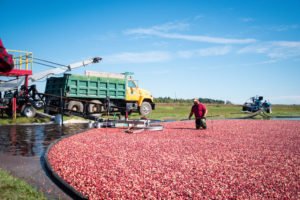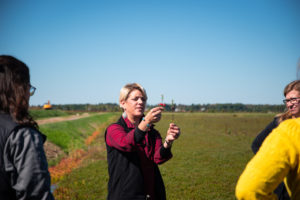Gaynor Cranberry Company is proudly owned by the Dempze family, who have been growing cranberries in Wood County for over 140 years. Heidi Slinkman and her sister Jennifer Dempze are the fourth generation of the Marshes of Cranmoor. Heidi affectionately calls this pair of sisters the “Gaynor Girls.”
As breeders Ocean Spray100% of their 200-acre farm has been verified as sustainable.
“We are one of the greatest American stories you have ever heard,” Heidi said.
The Gaynor Cranberry company was founded in 1876 by a pair of Irish brothers. Heidi’s great-grandfather succeeded the Gaynor brothers.
Cranberries come from North America. The Gaynor Girls proudly continue the generational legacy of the Gaynor Cranberry Company while contributing to Wisconsin’s ranking as the nation’s top cranberry-producing state.
Gaynor Cranberry Company supplies cranberries to Ocean Spray. 100 percent of their 200-acre farm is certified to be sustainable.
“We absolutely value sustainability in all aspects of agriculture and farming,” Heidi noted. “When I think about sustainability, I think about the economy, the environment, the next generation, people, community, resources and wildlife. All of these elements are absolutely valuable and essential to us.”
For every acre of cranberries planted, the Gaynor Cranberry Company has another six acres of supporting land. The area serves as a wildlife habitat and supports indispensable pollinators.
Cranberries do not self-pollinate. Bees are brought into the swamps to aid pollination. Pollinator health is crucial to the success of cranberry crops.
Responsible water operate is a priority at Gaynor. The team uses water-saving technologies to ensure the vines receive nutrients at the right time and in the right amounts to grow berries and protect water resources.
Cranberries are a perennial plant, so irrigation is used to protect the plant from frost. By protecting this year’s berries, growers are also protecting next year’s harvest
Water is used to harvest state fruits. Cranberries float to the surface of the water thanks to the four empty air pockets inside the berry.
“We work smarter, not harder,” Heidi noted. “When we float the berries, they are easier to pick.”
Water is a tool in the cranberry grower’s toolbox.
The Gaynor Cranberry Company team uses water responsibly, using only as much water as needed. Water is a resource that is borrowed and shared with neighbors. In the swamp, neat water is valued because their families drink, play and swim in the water.
To maintain economic balance, Gaynor Cranberry Company balances labor and machinery. Marsha employees are treated like family.
“Our people and community are our greatest asset, as is the land we protect and continue to farm on,” Heidi said.
Cranberry growers are precision farmers. At Gaynor Cranberry Company, we always strive to operate best management practices to handle the berries efficiently. The equipment must be gentle to the fruit and enable quick harvesting.
The equipment for harvesting cranberries is very specialized. Cranberry growers are self-made engineers who design and invest for themselves.
Food safety is a top priority at Gaynor Cranberry Company. Heidi holds her team to high standards and tough guidelines and expectations to maintain a neat and vigorous product. They work difficult to keep the swamps neat.
Fruit from the Dempze family farm travels nearby to the Ocean Spray factory in Wisconsin Rapids, where it is used to produce raisins, juices or concentrates.
Once the berries arrive at the plant, Ocean Spray can determine the best operate for each berry. Berries that are not used for human consumption can be recycled as feed for pets and cattle.
The cranberry industry is a forceful part of Wisconsin’s heritage and economy. The Dempze family realizes that to preserve this heritage for many years to come, they must support sustainable agriculture.
Heidi thinks the cranberry bed is one of the most handsome places in the world. The marshes are home to an incredible amount of birds, from bald eagles and golden eagles, to whooping and sandhill cranes, owls, loons and songbirds. They take pride in maintaining vigorous farms because they are directly connected to the environment.
“We work and live on the land,” Heidi said. “The connection with the land is highly valued. It’s easy to talk about it because we’ve always done it.”




